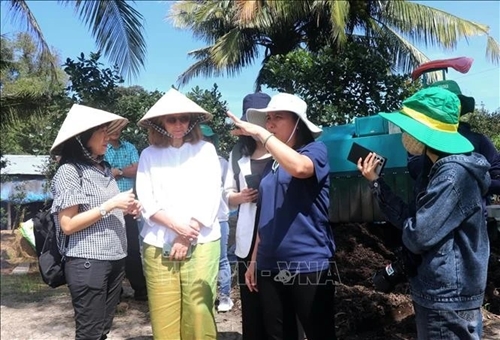The visit is intended to aid in the exchange information and promote dialogue between Vietnam and Canada on sustainable agricultural development, contributing to efforts to address climate change challenges.
    |
 |
|
The Can Tho agricultural sector's representative introduces a pilot model of high-quality and low-emission rice cultivation to the Canadian Embassy's delegation. |
During the visit, the delegation engaged in discussions with the city Department of Agriculture and Rural Development, cooperative representatives, rice farmers, businesses, and related agencies about the project’s challenges and opportunities.
Nguyen Cao Khai, Director of the Thuan Tien Cooperative, said that cooperative members had received training to participate in the pilot project. Farmers have embraced the recommended low-emission, high-quality rice cultivation practices and implemented them collaboratively.
The cooperative currently cultivates 50 hectares of rice with partial financial support. After two crops, members reported notable success, including reduced input costs and increased income of 1–6 million VND (approximately 39–236 USD) per hectare compared to traditional methods. Additionally, rice straw is now repurposed for mushroom cultivation, generating additional income while eliminating field burning and its associated emissions.
Low-emission rice farming not only boosts farmers’ income but also safeguards their health and protects the environment by minimizing the use of fertilizers and pesticides, Khai emphasized, adding that the cooperative plans to continue expanding this sustainable production method even after the pilot project ends.
Recognizing the potential of low-emission rice, Hoang Minh Nhat JSC in Thoi Lai district, Can Tho city, has joined the project. According to Le Hai Trieu, a company representative, Hoang Minh Nhat exports rice to markets in Europe and Canada and collaborates with Japanese exporters to establish a "low-emission rice" brand for the Mekong Delta.
To access demanding international markets, strict control over pesticide residues and microelements in rice is essential. To meet these standards, the company has worked closely with farmers, introducing them to suppliers of fertilizers and pesticides that comply with the project’s guidelines, he said, adding that this collaboration reduces input costs, increases farmers’ incomes, and ensures that rice meets export-quality standards.
“To encourage farmers to adopt low-emission, high-quality rice cultivation, we offer a price bonus for every kilogram of rice that meets quality and standard requirements,” Trieu added.
During her first visit to observe this innovative rice production model, Bellone highlighted the importance of low-emission and high-quality rice fields, saying that initiatives like these address significant challenges for Vietnam and play a crucial role in helping the country achieve its net zero commitments.
Source: VNA